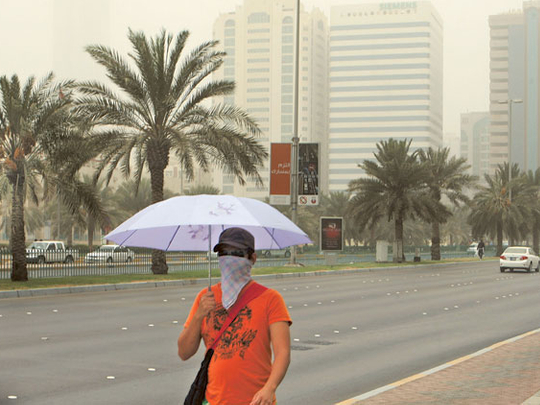
Abu Dhabi: As temperatures rise across the country, infections of the nose and throat, as well as skin rashes, become commonplace.
Doctors have therefore urged residents to adopt the necessary precautions in order to avoid infections that could be caused by dust in the air, including taking the prescribed medicines and inhalers.
“As the season changes from winter to summer, many people in the UAE begin to suffer from inflammation of the nasal passages as a result of allergic reactions to airborne substances. This is known as allergic rhinitis, and we see a 10 to 20 per cent increase of such cases,” said Dr Roshan John, internal medicine specialist at Lifeline Hospital in Abu Dhabi.
“There is also a 10 per cent increase in the number of cases of allergic asthma, especially among those between 30 and 50 years of age,” he added.
Most cases of allergic rhinitis however resolve themselves with some care.
“Patients need to take their prescribed inhalers regularly, and nasal decongestants could be recommended when they see a doctor. It is however important not to skip any medicinal doses during this season. In addition, it is advised to avoid strenuous exercise during the switch from winter to summer,” Dr John said.
Despite these preventative measures, some 10 per cent of patients do end up developing chest infections, which take up to a week to heal with prescribed antibiotics.
Dr Mushtak Al Saadi, family medicine specialist at HealthPlus clinic, also said that individuals who are prone to such allergies, and symptoms like cough, runny nose and burning eyes during seasonal changes, could start taking anti-histamines beforehand.
“While many anti-histamines are available at pharmacies, patients should see a doctor to decide which one is right for them,” he added.
Dry skin conditions, such as eczema, also become more frequent during this time, especially among those of Caucasian descent.
“These are closely linked to allergic rhinitis. It is recommended that people prone to it stay hydrated, and see a dermatologist for any lotions if the rashes get worse,” Dr John said.
In addition, he recommended people avoid spicy foods because these tend to trigger reflux and congestion of the nose and throat.
Dr Al Saadi also advised parents to take extra care of children below the age of four because they are especially prone to allergic asthma.












